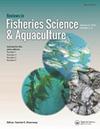Translocation of Wild Trochus niloticus: Prospects for Enhancing Depleted Philippine Reefs
引用次数: 9
Abstract
Intentional release of wild-caught individuals has been widely used to establish new populations of the commercially valuable but threatened reef gastropod Trochus niloticus in oceanic islands. Is this also a viable strategy to enhance depleted populations of this species and other marine invertebrates? We monitored growth and survival of 765 translocated individuals and 486 in their original habitat for 5–9 months. Individuals translocated to a severely overexploited reef (mainland Palawan) grew 2–3 times faster than those at Tubbataha Reefs Natural Park, Phillipines. Despite variations in growth between the three sites, survival probabilities were consistently high, ranging between 0.77 and 0.92. So translocation is feasible, and sites at which a species has previously been found are likely to be suitable for their growth and survival. If site management can control over-fishing, this approach is likely to be a valuable tool for enhancing field populations of a large invertebrates like Trochus that have a short lived planktonic larva.野生niloticus的易位:改善枯竭菲律宾珊瑚礁的前景
有意释放野生捕获的个体已被广泛用于在海洋岛屿上建立具有商业价值但受到威胁的礁腹足动物Trochus niloticus的新种群。这也是一种可行的策略来增加这个物种和其他海洋无脊椎动物的数量吗?对765只迁移个体和486只迁移个体在原生地的生长和生存情况进行了5-9个月的监测。转移到严重过度开发的珊瑚礁(巴拉望岛大陆)的个体增长速度是菲律宾图巴塔哈珊瑚礁自然公园的2-3倍。尽管三个地点的生长情况有所不同,但存活率始终很高,在0.77到0.92之间。因此,易位是可行的,以前发现过物种的地方很可能适合它们的生长和生存。如果现场管理可以控制过度捕捞,这种方法很可能是一个有价值的工具,用于增加大型无脊椎动物的野外种群,如Trochus,它们的浮游幼虫寿命很短。
本文章由计算机程序翻译,如有差异,请以英文原文为准。
求助全文
约1分钟内获得全文
求助全文

 求助内容:
求助内容: 应助结果提醒方式:
应助结果提醒方式:


